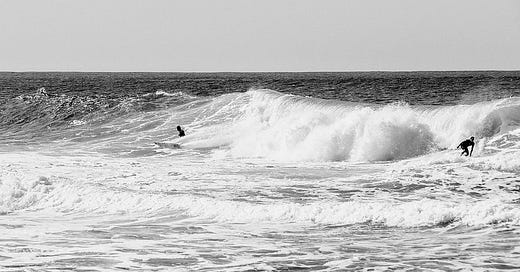“The climate crisis can be understood as an experiment in pace.”
Bill McKibben is one of those people who make you tired (or inspired) when you look at what they’ve done. He’s a long-time environmental activist, he writes at a frenetic pace, he’s a cofounder of the activist group 350.org,1 which has organized some of the largest climate change protests across the globe, he’s a dedicated and decorated college professor, he’s an inveterate hiker and, for a while, in the middle of all his other activities, he trained himself into an elite cross-country skier.
Heaving a sigh, taking a deep breath.
McKibben is, or has been, perhaps the best example of pragmatic optimism in the climate morass. His approach has wrought change, but never enough to save the world; his practice is to celebrate whatever victories come the planet’s way — stopping the Keystone pipeline project, say, or the passage of the deeply flawed but perhaps useful Inflation Reduction Act — and immediately move on. “That’s done; next!”
So it was something of a surprise to see his New York Book Review essay, “Where Will We Live,” in this week’s issue of the magazine.2 This is not an optimistic effort.
McKibben reviews three books: Nowhere Left to Go: How Climate Change Is Driving Species to the Ends of the Earth, by Benjamin von Brackel; “Nomad Century: How Climate Migration Will Reshape Our World,” by Gaia Vince; and “Border and Rule: Global Migration, Capitalism, and the Rise of Racist Nationalism,” by Harsha Walia.
He agrees with the portrait of our plight provided by these writers, and with some of their suggestions for adapting to the human and animal migrations that are already underway and are sure to increase dramatically under whatever degree of climate change is now inevitable, but doubts that they’re achievable in sufficient volume to be of much comfort. (Quoting here at length because the essay is paywalled.)
The climate crisis can be understood as an experiment in pace. By burning the remains of hundreds of millions of years of flora and fauna in the course of a few decades, we’re forcing the planet through changes that usually take eons; deep time is suddenly running like one of those films of a flower opening in seconds. In a geological instant we’ve raised the annual global average temperature one degree Celsius, and the second degree will come faster still; on our current course we’re headed toward a third degree. Astonishing shifts in precipitation, forest fires, sea level, and many other systems are happening month by month and season by season. The pace is truly savage.
…
Gaia Vince, in her book Nomad Century, points out that fires even in affluent places like California and Australia have begun to produce internal migrations. But wealth is a buffer. In poorer parts of the world a warming planet is already a daily grind; she reports that rice farmers in Vietnam are planting at night with headlamps to avoid dangerous heat, and the British medical journal The Lancet estimates that in 2018 “more than 150 billion work hours were lost due to extreme temperature and humidity.” (Of course, for many farmers their livelihood will be a thing of the past—parts of southern Vietnam, for instance, are expected to be below sea level by 2050.)
…
Let us state succinctly the most obvious point: none of these crises are caused by the people suffering from them. The average Somalian, at the epicenter of that withering drought, produces barely one two-hundredth as much carbon as the average American; the average Honduran a fifteenth as much; the average Vietnamese a seventh (and much of that comes from manufacturing stuff for export to us). The US, with 4 percent of the world population today, has produced a quarter of all the greenhouse gas emissions in the atmosphere; the carbon we pumped into the air during our industrialization and (especially) our suburbanization will linger there for a century or more. No country, not even far more populous ones like China, will come close to catching us. Somalian famine, Honduran hurricanes, Vietnamese inundation—these are crises caused by us, and given that many in industry and government have known the consequences of burning fossil fuels for decades, you could fairly say the climate crisis is a kind of crime Americans have been committing.
Harsha Walia says, and ultimately McKibben agrees, that hundreds of years of colonial and imperial predations inflicted by wealthy nations on the people of poorer ones should make unlimited accommodation of people fleeing the consequences of those actions, and now of climate change, a matter of reparations. McKibben also says he can’t see a political accommodation of open borders on even the most distant horizon.
About a week ago we were wondering what would constitute our ship coming in.3 McKibben, and the authors he reviewed, have clarified that: enough money to help protect the younger family for as far into the future as possible from the consequences of what their predecessors have done.
Of course there’s always the prospect of a miracle. We’re going to start a church. Any suggestions for a name?
Chet Baker and Art Pepper’s “The Route”— man. I was sitting in the easy chair reading a high-toned socialist magazine and feeling like I was in the slow act of a 1950’s noir novel, waiting for the doll to walk in and set things rolling. Those two play together like kissing cousins. Inspired me to get back writing this morning.
When that ended I took up The Horace Silver Quintet, “Finger Poppin,’” and then The Horace Silver Quintet and Sonny Rollins Trio playing separately and together on Swiss radio. Then a change of pace with the Buzzcocks album “Sonics in the Soul,” and finally Crumb with their 2019 album, “Jinx.”
That’s all we got, comrades. Be well, take care.




